- Department:Chemicals Administration Ministry of Environment
To ensure food safety during the Lunar New Year holiday, the EPA joined forces with the Ministry of Health and Welfare (MOHW) and the Council of Agriculture (COA) to monitor food safety. The EPA also reminds the public to only purchase domestic agricultural and fishery products that have clear origin labels and official certifications.
Food safety has always been a key focus of government policies. The EPA has therefore been working with different ministries to promote the “Five Rings of Food Safety” Policy. The five rings include: strengthening food source control, reestablishing a production-management food tracing system, increasing inspection capabilities, imposing harsher penalties, and encouraging public oversight. Through inter-ministerial cooperation, the five-ring policy is executed based on the responsibilities of each department. The EPA’s responsibility is to carry out atsource safety control to prevent chemicals that pose potential health risks from contaminating the food supply chain. The MOHW will enhance the sampling and inspection of agricultural products before they arrive at markets, and the COA will be in charge of food inspection in markets.
The EPA has experienced several occasions where toxic chemicals were found in food products in the past, such as the Rhodamine B found in glutinous rice, calls, metanil yellow and dimethyl yellow in dried tofu, maleic anhydride in starch and Sudan Red G in salted duck yolks for mooncakes. Therefore, to prevent toxic chemical substance contamination, the EPA has divided the control measures into two categories: policy making and source control.
To support the five ring policy, the EPA banned the use of 13 harmful chemical substances (e.g., Rhodamine B) in food on 26 September 2017. Companies that use these 13 substances in their products are stipulated to submit their operation reports regularly, clearly label all containers/packaging and handling premises, prepare material safety data sheets (MSDS), and obtain approval documents. Moreover, the EPA declared on 28 June 2018 another 14 chemicals, including Sudan Red, as toxic chemical substances that are illegal to use in food.
Companies that manufacture products containing these 14 substances shall start reporting operations from 1 January 2019. Additionally, all containers/ packaging and handling premises have to be labeled and material safety sheets completed by 1 July 2019. Companies must also acquire approval documents by 1 January 2020, which will be reviewed by Lunar New Year. To ensure the management and tracking of the chemical substances, approval documents are not to be used by other parties. The EPA has completed reviewing the operation reports and assisted enterprises to meet the requirements by Lunar New Year.
The EPA inspected over 3,000 chemical raw material enterprises in both 2017 and 2018. During the inspection visits, the EPA also informed the companies of the “four musts” of chemical substance management for food safety, which include: separate storage, clear labeling, usage notification, and flow tracking. The EPA will continue to investigate more companies in 2019. Also, the EPA has been working with health and agricultural agencies to conduct joint inspections around special holidays and did not find any banned toxic chemicals in food products in 2018.
To ensure food safety, the MOHW conducted extensive food samplings and inspections in supermarkets to get ready for Lunar New Year, which resulted in a 98% pass rate. The inspections targeted food manufacturers, sellers and restaurant operators, and encompassed a wide range of safety factors, including: operation registration, hygiene conditions, product labeling, and random testing for illegal food colorings. The COA concentrated in monitoring drug residues in seafood and inspecting meat quality, as meat and poultry are common dishes on Lunar New Year tables. The COA will also continue to promote the tracking system for agricultural products.
Any violation found in the inspection and testing process will be fined and punished under the law.
Amendments to the Toxic Chemical Substances Control Act ( 毒性化學物質管理法 ) were passed by the Legislative Yuan on 21 December 2018 and were renamed to the Toxic and Concerned Chemical Substances Control Act ( 毒性及關注化學物質管理法 ) by the president on 16 January 2019. The Toxic and Concerned Chemical Substances Control Act added new regulations on concerned chemical substances and expand the list of controlled substances to gradually strengthen the management of chemicals that are harmful to human health and the environment.

Source: EPA Major Environmental Policies, February 2019



